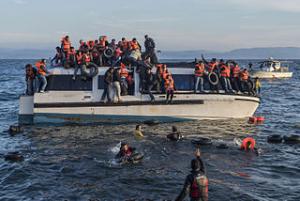Quick takesRefugees in Germany; Swedish border checks; ISIS’s British medics; U.K. flood defenses
German economist says Germany should expect a tough competition between refugees and poorer Germans; Sweden, as of midnight Sunday, began to impose strict identity checks of all travelers from Denmark; a British delegation, including an imam from London, has traveled to Sudan to try to dissuade young British doctors from joining ISIS; as parts of the United Kingdom braced themselves for more misery, the government’s storm-related actions are criticized.

Syrian refugees arriving in Greece // Source: commons.wikimedia.org
Germany: Competition between refugees, poorer Germans likely
Hans-Werner Sinn, the president of Munich-based IFO economic think tank, said Germany should expect a tough competition between refugees and poorer Germans. Sinn said he was worried about the impact of the refugee influx on the welfare state, warning of future distribution conflicts between refugees and Germans with modest incomes. “The welfare state will inevitably be damaged by free migration,” the prominent German economist said.” This would also hurt the poorest citizens, he added. IFO calculated that the integration of refugees will cost Germany 21 billion euros in 2016. In 2015 more than 1.1 million people came to Germany seeking asylum.
Sweden: ID required of from travelers from Denmark for first time since early 1950s
In an effort to significantly reduce the flow of refugees into the country, Sweden, as of midnight Sunday, began to impose strict identity checks of all travelers from Denmark. For the first time since the early 1950s, travelers by train, bus, or boat will need to present a valid photo ID, such as a passport, to enter Sweden from its southern neighbor. Travel operators who fail to impose checks will be penalized. Passengers who fail to present a satisfactory document will be turned back. The move is a stunning turning point for the Swedish ruling coalition of Social Democrats and Greens, which earlier presented itself as a model of generosity toward people fleeing conflict and terror in Asia and the Middle East.
U.K.: Dissuading British doctors from joining ISIS
A British delegation, including an imam from London, has traveled to Sudan to try to dissuade young British doctors from joining ISIS. The Islamist organization has been calling on foreign medics to come and help at its hospitals in Syria. The Foreign Office is coordinating efforts to prevent more Britons travelling from Khartoum’s University of Medical Sciences and Technology (UMST). At least seventeen British doctors travelled from there to Syria during 2015 to work for ISIS’s health ministry. The U.K. government has learned that a second group of U.K. doctors who left Sudan for Syria have joined up with members of an earlier group who travelled to join ISIS in March.
U.K.: Questions about flood defense funds
Prime Minister David Cameron has pledged £40 million to repair and improve flood defenses, but as parts of the United Kingdom braced themselves for more misery, the pledge has so far failed to stem criticism of the government. The extra funding relates to Storm Eva, which battered northern England, including Cumbria and Yorkshire, on Boxing Day. About £10 million will go to improving the Foss barrier, which protects York but was overwhelmed during the storm, leading to the evacuation of hundreds of people. The other £30 million will be spent repairing defenses on the Wharfe, Calder, Aire, Ouse, and Derwent, including repairs to pumping and barriers and clearing blockages in rivers. Questions were raised, however, about whether the money was new and how far it would go.
